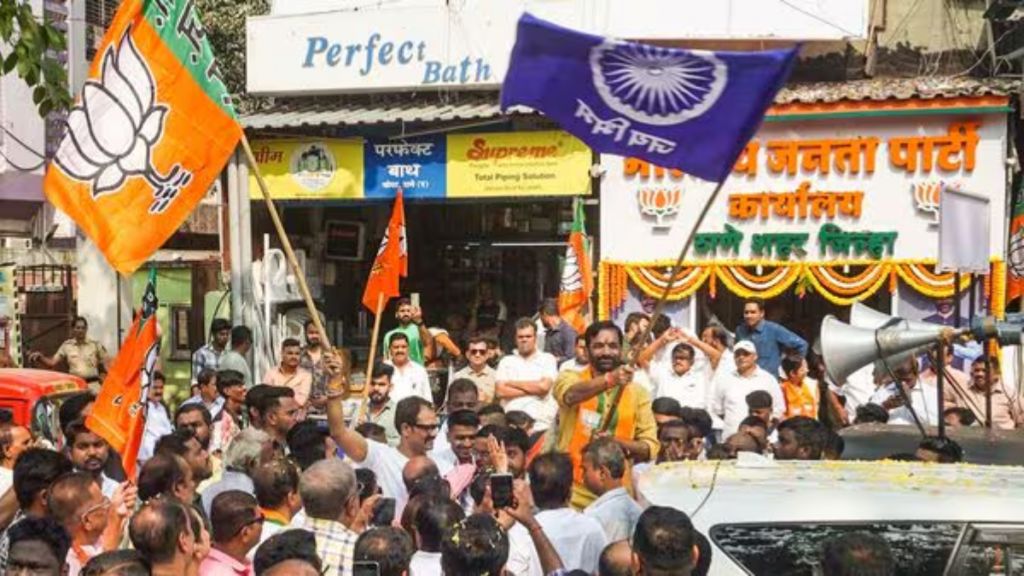
When the list of Maharashtra’s new guardian ministers was released this week by the government, an unprecedented trend of various leaders being upset with the announcement was seen. Deputy Chief Minister Eknath Shinde was so upset that he went away on an unplanned vacation to his village in Satara district, while leaders from Ajit Pawar’s NCP were unhappy, too, over some of them not being given prominent positions on the list. This is not the first time that such resentment is seen among the leaders of the Mahayuti, a political alliance of three parties that runs the Maharashtra government. Recently, similar feelings were seen and heard over the portfolio distribution and then over some other issues related to the sharing of power within the government. At the root of this is the BJP’s new agenda of being aggressive and taking over the lion's share in the newly-formed government.
In 2022, when Eknath Shinde decided to split from Uddhav Thackeray and brought 40 members of the legislative party of Shiv Sena with him to form the government in Maharashtra, the BJP was magnanimous and asked him to lead the government in the state despite having the biggest number in the House. For two and a half years, Shinde was the CM, and the BJP agreed to play second fiddle. But it is now becoming very clear and obvious that the BJP, with its huge victory in the latest assembly polls in Maharashtra, wants to change the dynamics by leading from the front. The party decided to be in the saddle with Devendra Fadnavis as the Chief Minister, keeping important portfolios such as the home ministry with it.
There was a lot of delay in portfolio distribution as both Eknath Shinde and Ajit Pawar insisted on certain ministries and the BJP made them struggle for it. As the dust over the dispute finally settled this week, a new struggle over the distribution of districts to be controlled by guardian ministers (in other words, who gets which district as its guardian minister) has erupted, and it’s clear that the BJP’s aggression over this issue has also caused a lot of strife.
In the BJP’s recent convention held at Shirdi, Chief Minister Devendra Fadnavis announced that the state would most probably face civic body polls in the next four months or so. Elections for Mumbai, Pune, Nagpur, Navi Mumbai, and ten other such municipal corporations have been pending for a long time. All political parties are now facing pressure from their activists to ensure that these elections happen before the monsoon season of 2025. It is a golden opportunity for thousands of party activists to get elected as municipal corporators, which is the stepping stone for any young party worker’s political career. The elections were delayed due to some legal issues over caste-based reservations. However, it is believed that the issue may finally be resolved in coming weeks. Thus, local body elections in Mumbai, Pune and other cities will now be on the BJP’s political agenda. Apart from this, the polls in over 25 district councils or zilla parishads will also be held simultaneously.
Most insiders feel that the reason behind the BJP going out of the way to dominate the overall political scene is nothing but the civic polls. But the big question is whether the alliance partners, such as Ajit Pawar and Eknath Shinde, will buckle under pressure exerted by the BJP or they will fight back and continue to assert their demands.
Many say that it is almost certain as on the other side of the political divide, in the Maha Vikas Aghadi (MVA), Uddhav Thackeray’s Shiv Sena, Sharad Pawar’s NCP, and the Congress party have decided to fight the civic polls separately and not in alliance with each other. This means there will be no seat-sharing deal happening in the MVA. If that is the situation in the MVA, will the Mahayuti also decide to fight the civic polls without seat-sharing?
In the last Mumbai civic polls, in 2017, the BJP and Shiv Sena fought separately without an alliance. Though the Shiv Sena managed to get more seats, the BJP was neck and neck in the contest. Traditionally, leaders from different political parties have believed that even if their organisations have an alliance with some other political outfit at the state level, it is always better to fight the civic polls without an alliance because that helps in keeping the grassroots activists motivated. If more and more activists or party workers have a chance to fight the civic polls, they are motivated and they work better in the next assembly polls. On the other hand, if an alliance happens resulting in lower number of seats available for a particular party, then activists tend to rebel and there is cross-voting.
The big question being asked now is whether the BJP’s aggression will push the alliance partners to decide that they should fight the civic polls separately without an alliance with the national party, a prospect that, in any case, they are thinking about. Most insiders feel that there are indications that the alliance partners of the BJP will decide to fight alone in metro city civic polls and test their strength.
Rohit Chandavarkar is a senior journalist who has worked for 31 years with various leading newspaper brands and television channels in Mumbai and Pune.